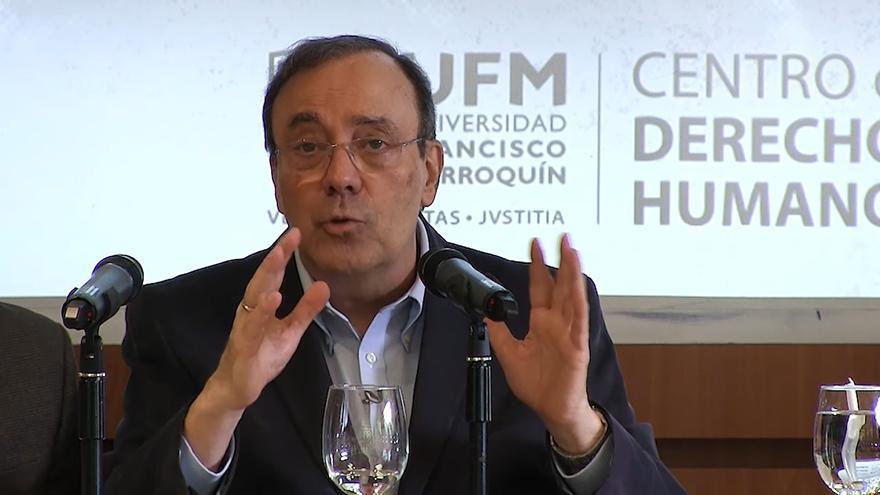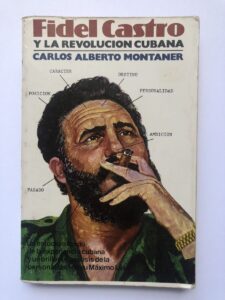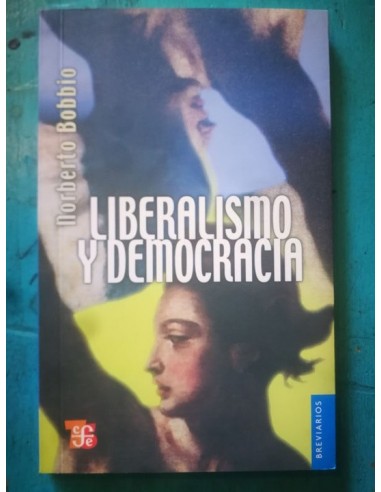It is with great sadness that I share the news that Carlos Alberto Montaner has passed away, writes Aimel Rios Wong, Senior Manager for Latin America and the Caribbean at the National Endowment for Democracy (NED).
Carlos Alberto was one of the greater public intellectuals of Latin America and one of Cuba’s greatest advocates for democracy; a prolific journalist, writer, analyst about Latin American and global political and social issues. A long-term friend of the NED, he was a partner of the Cuba portfolio in the 1990s, a contributor to the Journal of Democracy,* and a member of the International Coalition for Democratic Renewal. Last month, he published an emotional op-ed farewell from journalism entitled Mi última columna, in which he affirmed I Did My Best.
——————————————————————————————————————————-
Montaner, president of the Inter-American Institute for Democracy and one of the most prominent Cuban intellectuals in exile, died last Thursday after suffering from a neurodegenerative disease, according to the EFE news agency.
“There was not a day in his life that Cuba was not present,” said his daughter, journalist Gina Montaner, from Spain. “My father is a man who defended the freedom to live and die, and he wanted to die with dignity on his terms, and he did.”

Credit: Translating Cuba/YouTube capture
Montaner was known for his encyclopedic knowledge of all things Cuban, his wit and his skills as a raconteur. He mentored generations of young Cuban writers who found their way to his door in Madrid or Miami, The Wall Street Journal reports.
“In a world where unfortunately there are defenders of Castro-communism there was no one better than Carlos Alberto to refute those romanticisms, showing their faults and fallacies,” said Javier Corrales, a Cuba expert at Amherst College in Massachusetts.
Over more than six decades, Mr. Montaner became one of the most prominent voices in the Cuban diaspora with more than 25 novels and nonfiction commentary, The Post adds. Nearly all Mr. Montaner’s works blasted Cuba’s regime and predicted its demise, but with increasing frustration as the collapse of the Soviet Union in 1991 and Castro’s death in 2016 failed to bring sweeping changes in Cuba.
“There is a secret family of victims of totalitarianism, which can be the families in Burma or the victims in North Korea or in Iran or in Cuba,” he said in a 2011 interview with the George W. Bush Presidential Center. “We feel a special bond with them because we belong to the same family.”
In Spain, he witnessed a historic moment that served as a compass for his dream of freedom for Cuba: the transition from the Franco dictatorship to democracy, The Miami Herald adds:
“It was a great education to see that transition that he always dreamed of for Cuba,” his daughter said. “To see how it was possible to go from great hatred and resentment to a national consensus, to turn the page and reach democracy. “ Cuban activist and academic Sebastián Arcos Cazabón called Montaner “the first of the public and respected figures in exile to support the peaceful opposition” inside Cuba.
Castro failed
“The Cuban people know that the system Castro created has failed. Every day, they must reckon with the realization that communism has aggravated all of Cuba’s basic material problems to the point of desperation,” Montaner observed in a celebrated Foreign Policy debate – Was Fidel Good for Cuba? – with one of the regime’s leading apologists:
 Food, housing, drinking water, transportation, electricity, communications, and clothing are wants that cannot be compensated for by an extensive but very poor educational and health system. Paradoxically, even the revolution’s achievements incriminate the regime. The fact that Cuba has a reasonably educated population fosters the society’s desire for change and its dissatisfaction with a system bent on having the immense majority of Cubans live miserably. No one is more anxious to abandon egalitarian collectivism than the legion of engineers, doctors, technicians, and teachers forced to live without the slightest hope of betterment.
Food, housing, drinking water, transportation, electricity, communications, and clothing are wants that cannot be compensated for by an extensive but very poor educational and health system. Paradoxically, even the revolution’s achievements incriminate the regime. The fact that Cuba has a reasonably educated population fosters the society’s desire for change and its dissatisfaction with a system bent on having the immense majority of Cubans live miserably. No one is more anxious to abandon egalitarian collectivism than the legion of engineers, doctors, technicians, and teachers forced to live without the slightest hope of betterment.
Between 1952 and 1958, Cubans from all walks of life — students, businessmen, mothers, politicians — united in opposition against Fulgencio Batista‘s strongman regime, when “the talk was about democracy, freedom and respect for human rights; the… objective was to restore the rule of law that had been swept aside by Batista,” Montaner told PBS.
Initially sympathetic to the Cuban Revolution, the 16-year old Montaner joined the opposition Movimiento de Rescate Revolucionario (MRR) when he realized Fidel Castro’s Communist orientation. He was arrested and sentenced to 20 years in prison, EFE adds. With the help of his comrades, he managed to escape and found asylum in the Honduran Embassy, where he stayed from March to September 1961 along with 150 others.
 It has been estimated that 6 million people read Montaner’s weekly columns, syndicated throughout the hemisphere and he lectured frequently about the defense of liberty, economic development, and the role of culture in the evolution of societies, the Bush Center adds.
It has been estimated that 6 million people read Montaner’s weekly columns, syndicated throughout the hemisphere and he lectured frequently about the defense of liberty, economic development, and the role of culture in the evolution of societies, the Bush Center adds.
He authored numerous books, including Cuba, Castro, and the Caribbean: The Cuban Revolution and the Crisis in Western Conscience, Liberalismo y Democracia (Liberalism and Democracy), Viaje al Corazón de Cuba (Journey to the Heart of Cuba), and El Regreso del Idiota (The Return of the Idiot).
*Montaner’s Journal of Democracy article, which appeared soon after communism’s downfall throughout Central Europe and the electoral defeat of the Sandinistas in Nicaragua, stated unequivocally that Cuba was in the throes of a “terminal crisis,” the only question being “not whether Castro will fall, but when he will fall,” Orlando Gutierrez and Carl Gershman observed.
It reflected the common view at the time that the communist regime in Cuba would succumb to the wave of democratization then sweeping the world. The fall just a year later of the USSR, which had been Cuba’s main political and military ally and whose economic aid in the form of low-priced oil and other subsidies had underpinned Cuba’s failing economy, reinforced belief in the Castro regime’s inevitable collapse, they wrote for The JOD.
Montaner was often asked if he would return to Cuba if the current dictatorship fell, The Atlas Network adds. His answer was immediate: “The next day.” Sadly, despite his heroic efforts, his lifelong wish did not materialize.







